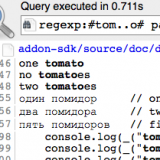
DXR is Mozilla’s fast, full-featured code search tool for doing structured queries, free-text searches, and regex matching on huge codebases, like Firefox’s. Since my last post, we’ve completely replaced the production hardware, integrated with VCSs, and made scads of indexing improvements. The last quarter’s highlights include…
- New stage and production hardware, with our own dedicated build box so we can support multiple codebases
- Nightly updates from the mozilla-central tree, for both stage and prod
- No more hours of downtime when a mozilla-central build fails
- Blame, log, diff, and raw-file links in the sidebar
- Much better JS syntax highlighting
- Linkifying much more C++ template stuff: references to class templates, template params, and base classes of class templates when the base class is also a template and dependent on the type params of the derived class template (phew!)
- Searching for namespaces and namespace aliases
- Better finding of C definitions and declarations
- Clang 3.3 support
Tell us what you want.
Now we want to hear from you. We’ve got a big, juicy fourth quarter coming up, and we want to make you happy. What would you, as a current or potential DXR user, like to see happen? Some ideas already high on our list are…
- Indexing multiple trees, like Aurora and comm-central, eventually targeting the full list from MXR
- A UI refit that will resolve client-side bugs, improve consistency, and add power. Take a look at the wireframes!
- Structured search for JS: finding function definitions and calls, variable refs, and so on
What are your highest priorities? What would help you hack better on Mozilla code today? Leave a comment about what’s most important to you, whether it’s in the above list or not, and we will build our Q4 goals based on what you say.
Also, I’ll be manning a table at the Innovation Fair at the Mozilla Summit in Santa Clara. Stop by and make DXR wishes in person!
Finally, thanks to the people who make DXR possible: fubar, for all his ops work; and jcranmer, abbeyj, nrc, Bruce Stephens, jonasac, and nicolaisi, who keep the patches rolling in faster than I can review them!
Blair McBride wrote on
:
wrote on
:
Nicholas Nethercote wrote on
:
wrote on
:
David Blewett wrote on
:
wrote on
:
Erik Rose wrote on
:
wrote on
:
Erik Rose wrote on
:
wrote on
:
patrick mcmanus wrote on
:
wrote on
:
Erik Rose wrote on
:
wrote on
:
patrick mcmanus wrote on
:
wrote on
:
Jonas Finnemann Jensen wrote on
:
wrote on
:
capella wrote on
:
wrote on
:
Erik Rose wrote on
:
wrote on
:
Erik Rose wrote on
:
wrote on
: